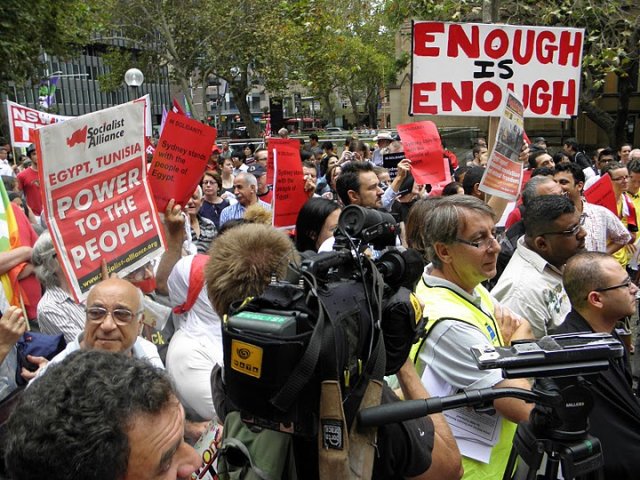
Popular uprisings in the Arab world have challenged a political landscape dominated by undemocratic regimes and fronted by dictators, a panel of academics and journalists said at a Sydney University forum on February 15.
Speakers discussed the regional and international ramifications of the uprisings in Tunisia and Egypt as part of the forum on people's power and change in the Arab world.
During the uprising in Egypt the secular nature of the protests was noted and praised in much of the international coverage. Less acknowledged, but similarly noteworthy, was the role women played in the demonstrations.
Women are "not new in [Egypt's] political arena", but the treatment of women taking part in demonstrations is certainly improving, said Dr Lucia Sorbera from the University of Sydney.
Dr Sorbera specifically pointed to last year’s International Women's Day demonstrations in Cairo where many women were "beaten and harassed". However, "today they feel safe, free to be there and they claim the right to feel safe in the public arena".
"A lot of young women will tell you, for the first time they feel they are not objectified as sexual objects in this space, this is the first time in a very long time that women have been in the streets without any danger of harassment," she said.
Tahrir Square in Cairo has become "synonymous with freedom, emancipation and liberty", said Farid Farid from the University of Western Sydney.
Farid spoke about the response of the people of Egypt to living under the Mubarak dictatorship: "After 30 years of repression you develop a sense of humour, a sense of mockery — it's the only form of resistance."
This repression was supported by foreign governments who assisted in sustaining regimes like Muburak’s — now widely considered to be corrupt, said Farid.
"Agitation for democracy has always been tangled with the politics of empires.
"Remember the last leader to meet with Mubarak was Netanyahu, but before that it was Kevin Rudd — in terms of Australian politics and trade relations, they are heavily entangled.
"Let's not discount Australia's role."
University of Sydney academic Tara Povey said: "This intimate relationship between Hosni Mubarak and the US has meant an active policy of demobilising and repressing movements for change in the Arab world."
Independent journalist and author Antony Loewenstein similarly noted the financial complicity of foreign governments: "The US sends to Egypt $1.2 billion annually."
Loewenstein also pointed out the role of multinationals in assisting regimes, particularly with media and communications censorship.
"The reality is that much of the infrastructure that these regimes are using to censor the internet is coming from the West," he said.
"In Iran for example, it emerged very soon after the uprising in June 2009 that Nokia sold Tehran — six months before the uprising — a very sophisticated monitoring system to be able to determine phone calls, internet, text messages.
"In Egypt, Vodafone, who many of us use, were involved with the Egyptian regime in censoring mobile phone messages and setting up propaganda for the regime when the phone system came back on."
Speaking on the Western media's representation of the uprisings in the Arab world, and pointing to a number of areas given undue legitimacy outside of Egypt, Loewenstein pointed out: "One of the other things that comes up is the fear of political Islam.
"The idea that we shouldn't engage with Hamas, Hezbollah, the Brotherhood etc ... They represent a lot of people, and may not be a majority, say the Brotherhood, how much support it has in Egypt is unsure, 10%, 20%, whatever, that's still 20%.
"It's vital to understand the idea that political Islam is not by definition a threat. Not all political Islam is Bin Laden in a cave in Afghanistan.
Acknowledging laughter from the audience, he continued: "People laugh when I say that, but if you look at much of the American mainstream coverage in the last three weeks, that is exactly how it is framed."
Loewenstein also noted the weight given by much Western media to the future of peace treaty negotiations with Israel, despite them being redundant, as "there actually is no peace process".
"One of the things that also has been a mantra of many in the Western press over the last three weeks is what's Cairo going to do with the peace treaty with Israel ... as if that's the main concern on the streets of Cairo," he said.
"A peace process is a term that has been used and abused by many in the press, the political elite, to give the impression of negotiations, when in fact all that is happening is the colonisation of Palestinian land in the West Bank. The siege on Gaza continues."
Loewenstein concluded: "What the West and Israel fear is not Islam, but independence."
The forum offered an insight into the social forces and strategic political relationships at play in the Arab world as people continue to rise up against dictatorial regimes throughout the region.
They are calling for democracy and radically changing the face of the Middle East and North African social and political sphere.

Comments
Anonymous replied on Permalink
Anonymous replied on Permalink
Anonymous replied on Permalink
Anonymous replied on Permalink